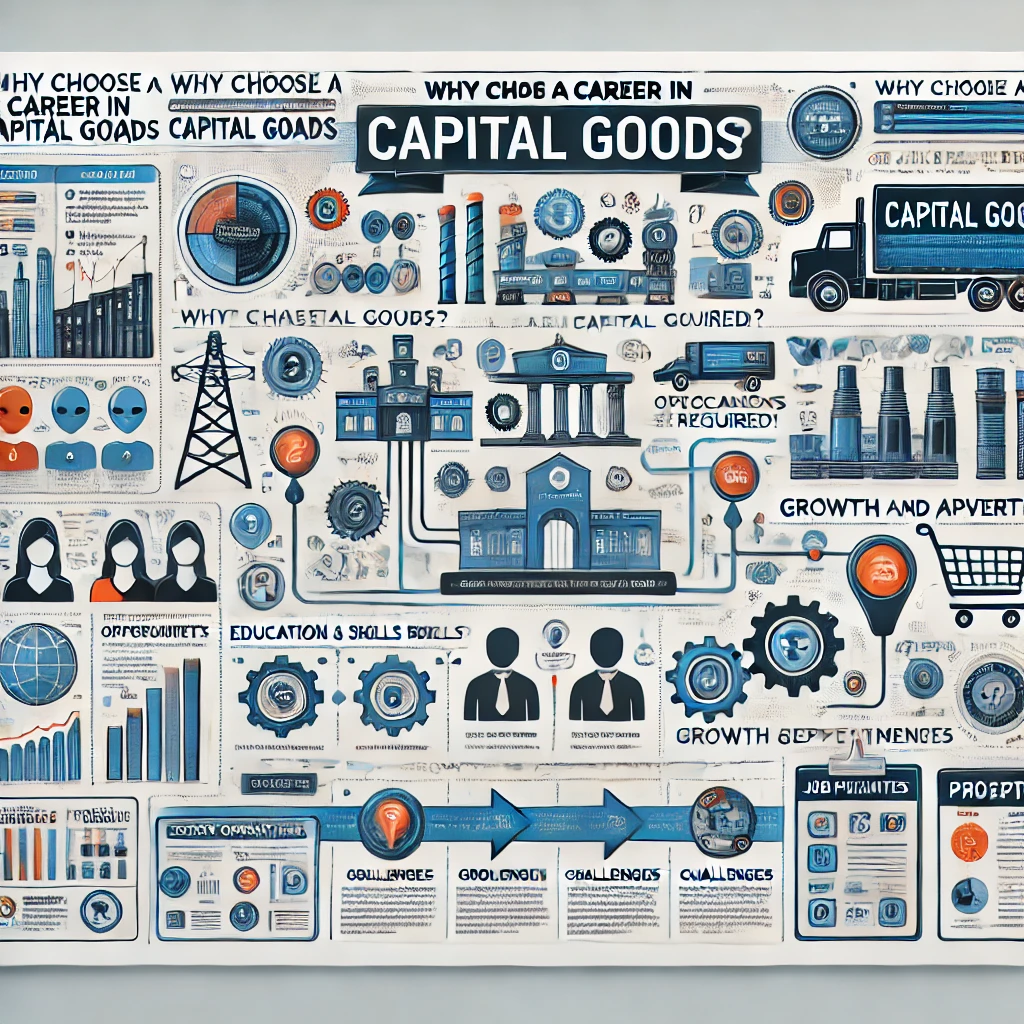Table of Contents
- Introduction
- What are Capital Goods?
- Overview of the Capital Goods Industry
- Why Choose a Career in Capital Goods?
- Education and Skills Required
- Job Opportunities in Capital Goods
- Salary Expectations
- Growth and Advancement in the Capital Goods Sector
- Challenges in the Capital Goods Industry
- Future Prospects of a Career in Capital Goods
- FAQs
Introduction
Choosing a career path is a significant decision that can shape your professional and personal life. With numerous industries to choose from, it’s essential to find one that aligns with your interests, skills, and long-term goals. One such industry that often goes unnoticed is capital goods. This blog post explores the question, “is capital goods a good career path?” and provides a comprehensive guide to help you make an informed decision.
What are Capital Goods?
Capital goods are physical assets used by businesses to produce goods and services. These include machinery, tools, buildings, vehicles, and equipment. Unlike consumer goods, which are purchased for personal use, capital goods are utilized to create products that are then sold to consumers. Examples of capital goods include industrial robots, conveyor belts, assembly line equipment, and heavy machinery.
Overview of the Capital Goods Industry
The capital goods industry is a crucial component of the global economy. It encompasses a wide range of sectors, including manufacturing, construction, aerospace, and defense. Companies in this industry produce the machinery and equipment that other industries rely on to operate. The demand for capital goods is often driven by economic growth and industrial development, making it a vital sector for job creation and innovation.
Why Choose a Career in Capital Goods?
Diverse Opportunities
One of the primary reasons to consider a career in capital goods is the diversity of opportunities available. The industry includes various fields such as engineering, manufacturing, supply chain management, and sales. This diversity allows you to find a niche that suits your skills and interests.
Stability and Growth
The capital goods industry is known for its stability and growth potential. As long as there is a need for industrial machinery and equipment, there will be demand for professionals in this sector. Economic growth and technological advancements also contribute to the industry’s expansion, providing ample opportunities for career advancement.
Innovation and Technology
Working in the capital goods industry allows you to be at the forefront of technological innovation. Companies in this sector continually invest in research and development to create more efficient and advanced machinery. This environment fosters creativity and provides opportunities to work on cutting-edge projects.
High Earning Potential
The capital goods industry offers competitive salaries and benefits. With the right education and experience, you can achieve a lucrative career. Positions in engineering, management, and technical sales often come with attractive compensation packages.
Education and Skills Required
Educational Background
To pursue a career in capital goods, a solid educational foundation is essential. Most positions require at least a bachelor’s degree in relevant fields such as engineering, manufacturing, or business. Specific disciplines that are highly valued in this industry include mechanical engineering, industrial engineering, electrical engineering, and materials science.
Technical Skills
Given the nature of the industry, technical skills are crucial. These include proficiency in computer-aided design (CAD) software, understanding of manufacturing processes, and knowledge of industrial machinery. Familiarity with automation and robotics is also becoming increasingly important.
Soft Skills
In addition to technical skills, soft skills play a significant role in a successful career in capital goods. Communication, problem-solving, teamwork, and project management skills are essential for collaborating with colleagues, clients, and stakeholders. Leadership abilities are particularly valuable for those aiming for managerial positions.
Job Opportunities in Capital Goods
Engineering Roles
Engineers are at the heart of the capital goods industry. They design, develop, and maintain machinery and equipment. Common engineering roles include:
- Mechanical Engineer
- Electrical Engineer
- Industrial Engineer
- Manufacturing Engineer
Manufacturing and Production
Professionals in manufacturing and production oversee the creation of capital goods. They ensure that products are made efficiently and meet quality standards. Key roles include:
- Production Manager
- Quality Control Inspector
- CNC Machinist
- Assembly Line Supervisor
Sales and Marketing
Sales and marketing professionals in the capital goods industry play a vital role in driving business growth. They identify potential clients, promote products, and manage customer relationships. Positions in this area include:
- Technical Sales Representative
- Marketing Manager
- Business Development Manager
- Customer Support Specialist
Supply Chain and Logistics
Efficient supply chain and logistics management is essential for the capital goods industry. Professionals in this field ensure the timely delivery of materials and products. Key roles include:
- Supply Chain Manager
- Logistics Coordinator
- Procurement Specialist
- Inventory Manager
Salary Expectations
The salary for careers in capital goods varies based on factors such as education, experience, and job role. Here are some average salary ranges for common positions in the industry:
- Mechanical Engineer: $70,000 – $100,000
- Production Manager: $80,000 – $120,000
- Technical Sales Representative: $60,000 – $90,000
- Supply Chain Manager: $85,000 – $110,000
These figures are approximate and can vary based on location and company size. Overall, the capital goods industry offers competitive compensation packages that can provide a comfortable standard of living.
Growth and Advancement in the Capital Goods Sector
Career Progression
The capital goods industry offers numerous opportunities for career growth and advancement. Starting in entry-level positions, professionals can move up the ranks to supervisory and managerial roles. Continuous learning and professional development are crucial for climbing the career ladder.
Professional Development
Many companies in the capital goods industry invest in their employees’ professional development. This includes on-the-job training, mentorship programs, and support for continuing education. Obtaining certifications and attending industry conferences can also enhance your skills and career prospects.
Networking
Building a strong professional network is essential for career growth. Joining industry associations, attending trade shows, and participating in online forums can help you connect with peers and industry leaders. Networking can lead to new job opportunities and valuable insights into industry trends.
Challenges in the Capital Goods Industry
Technological Advancements
While technological advancements drive innovation, they also pose challenges. Keeping up with rapid changes in technology requires continuous learning and adaptation. Professionals must stay updated with the latest developments to remain competitive.
Economic Fluctuations
The capital goods industry is susceptible to economic fluctuations. Economic downturns can lead to reduced demand for machinery and equipment, affecting job stability. However, the industry’s long-term growth potential can mitigate these challenges.
Global Competition
Globalization has increased competition in the capital goods industry. Companies must compete with international manufacturers, which can impact pricing and market share. Professionals in this field need to be aware of global market dynamics and adapt accordingly.
Future Prospects of a Career in Capital Goods
The future of the capital goods industry looks promising. Technological advancements, such as automation, robotics, and artificial intelligence, are transforming the industry. These innovations are expected to increase efficiency and productivity, driving demand for skilled professionals.
Sustainability is another key trend shaping the future of the capital goods industry. Companies are focusing on developing eco-friendly machinery and processes to reduce their environmental impact. This shift towards sustainability creates new opportunities for careers in green technology and sustainable manufacturing.
The global demand for infrastructure development, particularly in emerging markets, also bodes well for the capital goods industry. As countries invest in infrastructure projects, the need for machinery and equipment will rise, leading to job creation and industry growth.
FAQs
Is capital goods a good career path for recent graduates?
Yes, capital goods is a good career path for recent graduates. The industry offers diverse opportunities, competitive salaries, and the chance to work on innovative projects. With the right education and skills, recent graduates can build a successful career in this field.
What skills are essential for a career in capital goods?
Technical skills, such as proficiency in CAD software and knowledge of manufacturing processes, are essential. Soft skills like communication, problem-solving, and teamwork are also crucial for success in the capital goods industry.
How can I advance my career in the capital goods industry?
Advancing your career in the capital goods industry involves continuous learning, obtaining certifications, and building a strong professional network. Seeking mentorship and gaining experience in various roles can also help you climb the career ladder.
What are the challenges of working in the capital goods industry?
Challenges in the capital goods industry include keeping up with technological advancements, dealing with economic fluctuations, and facing global competition. Staying updated with industry trends and continuously improving your skills can help mitigate these challenges.
What is the future outlook for the capital goods industry?
The future outlook for the capital goods industry is positive. Technological advancements, sustainability initiatives, and global infrastructure development are expected to drive growth and create new opportunities in the industry.
Conclusion
So, is capital goods a good career path? The answer is a resounding yes. The industry offers diverse opportunities, competitive salaries, and the chance to work on innovative and impactful projects. With the right education, skills, and dedication, you can build a rewarding and successful career in the capital goods sector. Whether you’re a recent graduate or a seasoned professional, the capital goods industry provides a promising and dynamic career path.




Leave a Comment